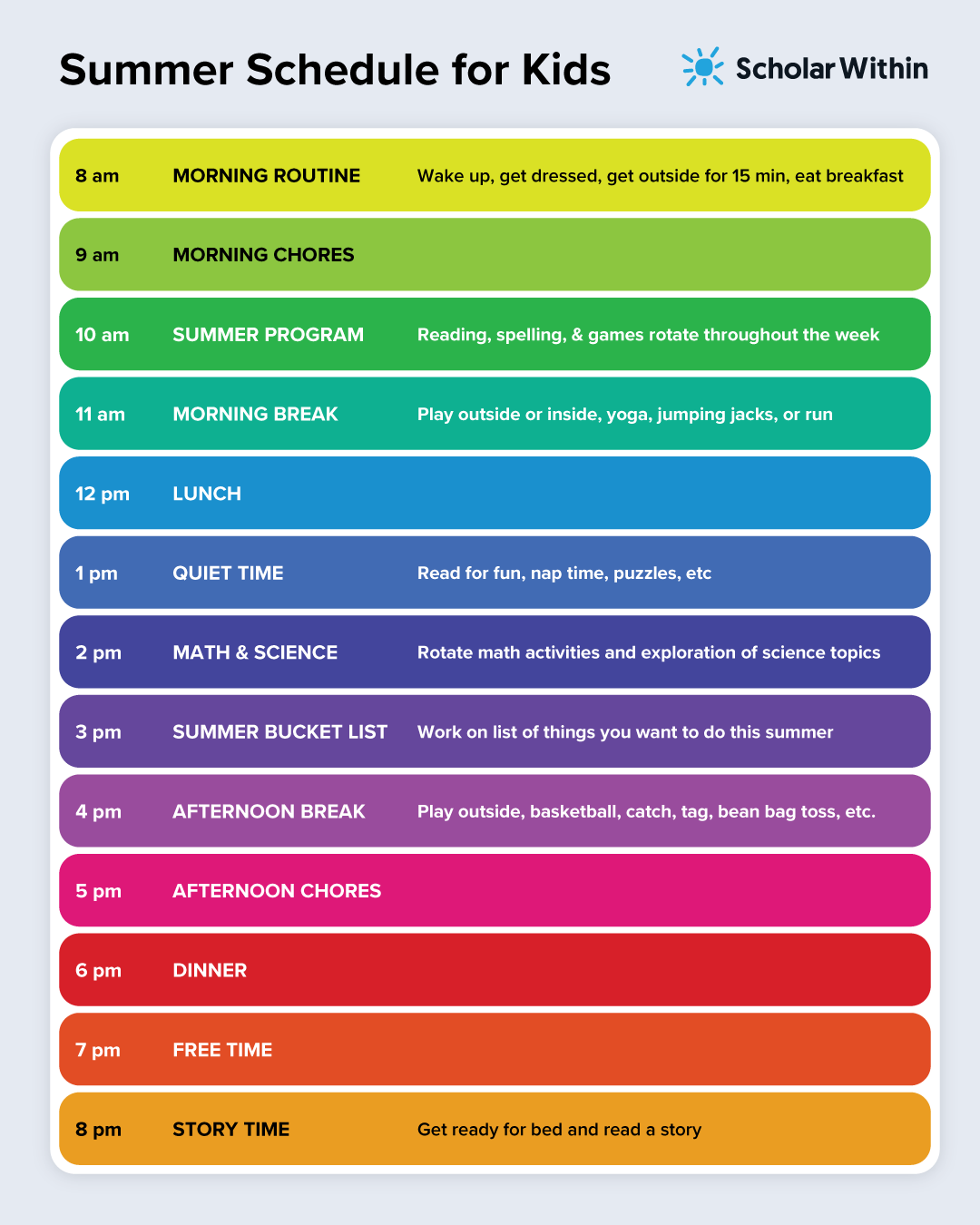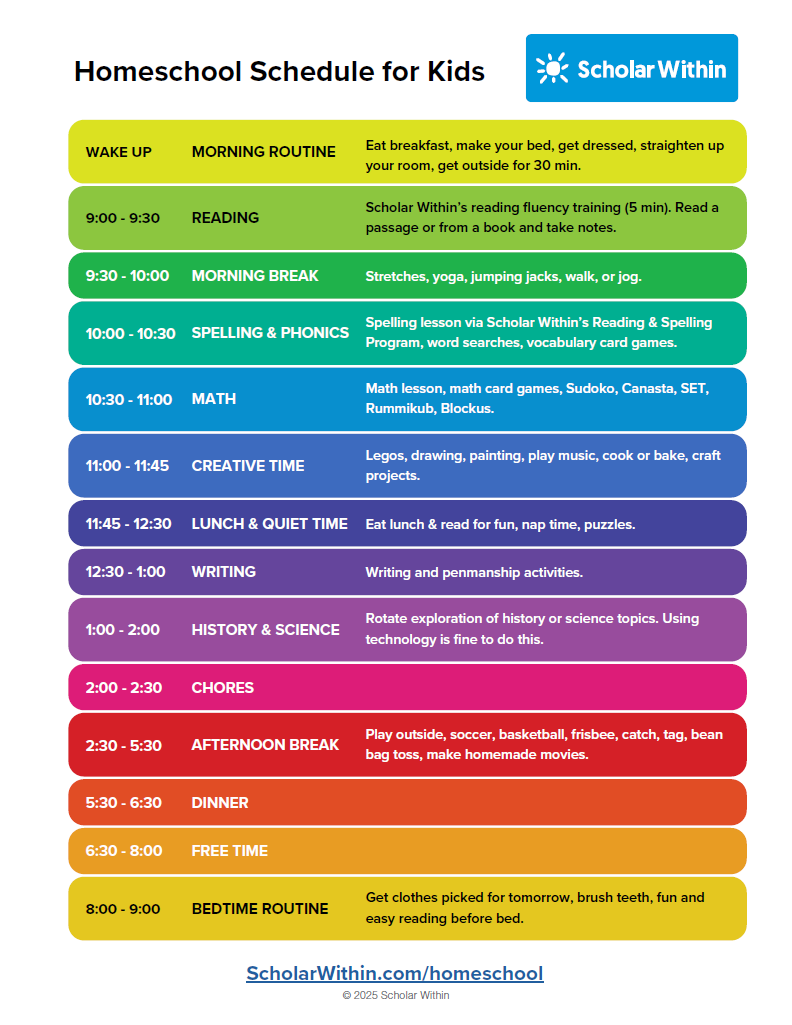
Summer Learning Loss: How to Prevent the Summer Slide
4 Steps to Stop Summer Learning Loss
Kids often lose much of what they learned from the school year over the summer. This is because most of the time, during the summer, we don’t spend much time stimulating the brain and keeping them active.
It’s typical for kids to lose between two and four months of learning over the summer. Kids who are already struggling can lose between four and six months!
In as little as 30-60 minutes a day, you can prevent your kids from having summer learning loss, and they’ll still have a bunch of free time.
Step 1: Daily, Weekly, and Monthly Planning
Planning is a HUGE part of growing up. If you don’t have a plan together, you are often just getting carried by the wind as life happens around you. Let your kids buy into their own success by having them plan their day, week, or month. Feel free to give them suggestions or some ideas, but push them to want to be productive or to get the most out of their summer and not have it pass by without doing the things that they wanted to do.
During the school year, most of the planning in their lives is already taken care of through school and specific after-school curricular activities like sports, scouts, or music. Instilling planning over the summer will be one of the real first chances they’ll get to make their own structure of their time.


The photos above are of our daily planner for kids that can be found in our 2nd through 8th-grade summer essential boxes. You must be enrolled in our summer reading program to get access to the summer box.
Our at-home, online Summer Reading Program instills planning along with other executive function activities. Each week, we also have a special Week In Review form that revisits what you did over the week, what you did the best, where you could use some improvement, and what you want to tackle the next week. Registration is now open.

Step 2: Get Access to Free Books Online
Your local library is a great resource for books! Did you know that most libraries let you borrow e-books or audiobooks online through apps like Overdrive? You will need a library card. Many libraries are issuing cards digitally. Find your local library here.
Open Library is another great resource where you do not need a library card. They also have a student library section that makes it easy to find grade-level appropriate books.
When you finish the book, have your kids write a quick book report. Have them write down what they liked and didn’t like. Have them draw a picture. Graphic organizers, like those in our Summer Reading Program, can help with this to make it easy to fill in the blank.
When your kids write down what they have read, it increases their ability to make multiple connections and memories and think more critically about what they have read.
Step 3: Listen to Podcasts
We love listening to podcasts to build our factual knowledge. We love learning about new things! Podcasts can be a great way to learn about something while in the car or around the house. There are podcasts on thousands of topics that can expand your knowledge about specific topics. Some of our favorite podcasts include But Why: A Podcast for Curious Kids and Wow in the World. For older kids, take a look at Science Friday. You may have caught the show on NPR on a Friday, but check out their website. They have tons of episodes! For the high school and adults, take a listen to Radio Lab. Please note that Radio Lab has some material that may not be suitable for children.
For more great podcasts for kids, take a look at this top 25 podcasts for kids list.
Step 4: Enroll in our Summer Reading Program
Our comprehensive Summer Reading Program focuses on boosting not only reading skills but planning, executive function, brain-body, and overall learning skills.
Our program makes learning over the summer easy. We give you step-by-step instructions on what you should do with your kids each day. Each day there are 4-6 different short activities that you do for a total of 45-60 minutes.

Our 6-Week, 8-Week, and 10-Week Summer Reading Programs include:
- Reading Fluency Training
- Reading Comprehension Lessons
- Spelling and Phonics Lessons
- Executive Function Activities
- Mind-Body Connection Activities
- Video and Audio Lessons
- Weekly Schedule and Planning Forms
- Graphic Organizer Printables
- Word Attack Printable Card Games
- Easy Online Access
- Help and Support
Our summer reading program is the ultimate learning program that you can do over the summer. We have designed it with the secret sauce to help your kids use their brains more efficiently and actually improve their reading skills.
This program will help your kids will learn how to read faster with less effort. Your kids will learn strategies for understanding and remembering what they have read. Plus, your kids will learn how to spell accurately and confidently by using spelling patterns.
Summer learning loss can now be a thing of the past.
Sign up for our Summer Reading Program.

How many words per minute are your kids reading?
What is considered being at grade level for words read per minute? The following is a guideline you can use to gauge your child. These word-per-minute rates are based on reading passages of text at grade level. Over the years I’ve been teaching, the reading rates for each grade level have risen progressively. This is where they currently are:
- 1st Grade (Spring): 53 – 111 wpm
- 2nd Grade (Spring): 89 – 149 wpm
- 3rd Grade (Spring): 107 – 162 wpm
- 4th Grade (Spring): 123 – 180 wpm
- 5th Grade (Spring): 139 – 194 wpm
- 6th-8th Grade (Spring): 150 – 204 wpm
Hasbrouck, J. & Tindal, G. (2017)
Have your child read a selection at grade level and see how many words per minute they can read accurately with fewer than 4 mistakes. We also have sample reading selections that you can use to assess your child.
If your kids are at the low end or if you want them to advance faster and make learning easier, consider giving them a reading boost with our Summer Reading Program 2024.
Who is Scholar Within?
Scholar Within was founded by learning expert Bonnie Terry, M.Ed., BCET. Bonnie started designing and developing her own custom educational tools when she started her private learning center in the 1990s. Teachers kept asking what she was using with the kids who saw her because of the dramatic improvements that the kids made in school. From here, Bonnie decided to make her materials available to teachers and families worldwide.
Now, Bonnie Terry has turned her materials into a full-service online program that you can follow step-by-step at home and on your schedule. School alone is not enough anymore. Bonnie’s programs boost your child’s overall learning skills by focusing on improving the auditory, visual, and tactile processing areas of your brain to make it work more efficiently.



